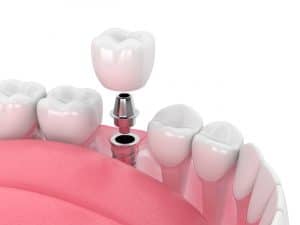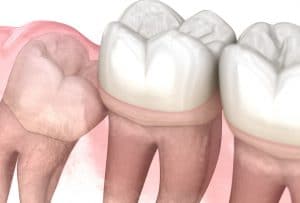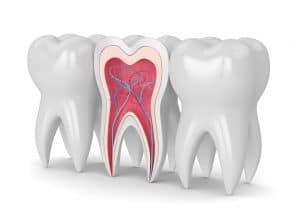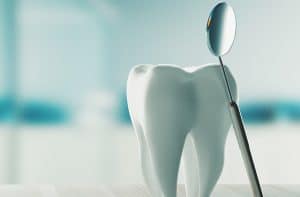 Maintaining good oral health habits such as flossing, brushing, and being conscious of your snack intake are great ways to keep your teeth cleaner throughout the day. While you may be partaking in these activities, unfortunately, harmful bacteria still may be attempting to threaten your smile’s health. Cavities are actually a more common dental circumstance than one might initially believe, which is why the office of Gentle Smiles Family Dentistry in Dallas, Texas stresses the importance of attending appointments to ensure your oral health is taken care of. If you are experiencing tooth sensitivity, chances are, you may be experiencing the effects of a cavity.
Maintaining good oral health habits such as flossing, brushing, and being conscious of your snack intake are great ways to keep your teeth cleaner throughout the day. While you may be partaking in these activities, unfortunately, harmful bacteria still may be attempting to threaten your smile’s health. Cavities are actually a more common dental circumstance than one might initially believe, which is why the office of Gentle Smiles Family Dentistry in Dallas, Texas stresses the importance of attending appointments to ensure your oral health is taken care of. If you are experiencing tooth sensitivity, chances are, you may be experiencing the effects of a cavity.
Securing Your Smile with Dental Implants
 It goes without saying that oral health is a top concern, but that each dental emergency or situation is unique in nature. You may have experienced a tooth getting chipped or cracked, or even tooth loss altogether. What can be even more harmful are diseases that can occur due to these injuries and blemishes in the time it takes to get them fixed. When it comes to restoring your bite, you want to make sure that you do not put it off, as waiting can have serious negative effects on your oral health, such as the spreading of harmful bacteria. Fortunately, Gentle Smiles Family Dentistry in Dallas, Texas may just have the restorative solution for you to revitalize your smile and protect your health, and that is getting dental implants.
It goes without saying that oral health is a top concern, but that each dental emergency or situation is unique in nature. You may have experienced a tooth getting chipped or cracked, or even tooth loss altogether. What can be even more harmful are diseases that can occur due to these injuries and blemishes in the time it takes to get them fixed. When it comes to restoring your bite, you want to make sure that you do not put it off, as waiting can have serious negative effects on your oral health, such as the spreading of harmful bacteria. Fortunately, Gentle Smiles Family Dentistry in Dallas, Texas may just have the restorative solution for you to revitalize your smile and protect your health, and that is getting dental implants.
Tips to Keep Your Teeth Cleaner throughout the Day
 There are seemingly endless tips and advice for improving your smile’s appearance, dealing with a toothache, and several other smile goals. Fortunately, the tips that typically involve preventing dental health concerns are often similar, and typically, they revolve around keeping your teeth consistently clean and free of harmful oral bacteria. This is the main point of your daily dental hygiene routine, but to successfully keep your teeth clean and avoid common dental concerns, you may benefit from following these few tips, as well. (more…)
There are seemingly endless tips and advice for improving your smile’s appearance, dealing with a toothache, and several other smile goals. Fortunately, the tips that typically involve preventing dental health concerns are often similar, and typically, they revolve around keeping your teeth consistently clean and free of harmful oral bacteria. This is the main point of your daily dental hygiene routine, but to successfully keep your teeth clean and avoid common dental concerns, you may benefit from following these few tips, as well. (more…)
Why You Shouldn’t Ignore Grinding Your Teeth
 Some signs of dental health trouble are easily recognizable. For instance, if you see that your gums bleed a lot when you brush and floss your teeth, then there’s a good chance that gingivitis (early gum disease) is the cause. If you have a toothache, then it could be the result of several potential reasons, but you may be able to at least recognize what tooth is in trouble. However, some signs can seem like something you don’t have to worry about. For example, many people who grind their teeth habitually don’t think it means anything serious, until their teeth start to show the consequences of the unchecked grinding problem. (more…)
Some signs of dental health trouble are easily recognizable. For instance, if you see that your gums bleed a lot when you brush and floss your teeth, then there’s a good chance that gingivitis (early gum disease) is the cause. If you have a toothache, then it could be the result of several potential reasons, but you may be able to at least recognize what tooth is in trouble. However, some signs can seem like something you don’t have to worry about. For example, many people who grind their teeth habitually don’t think it means anything serious, until their teeth start to show the consequences of the unchecked grinding problem. (more…)
Why Wisdom Teeth Are Often Extracted
 Though tooth extraction isn’t a typically recommended dental treatment option, there are some conditions in which extracting a tooth is your smile’s best option. The need for tooth extraction can stem from several different specific reasons, but in each case, it’s due to the fact that the tooth can’t be saved or restored. For example, one of the more frequently extracted types of teeth include wisdom teeth, which can become impacted and unable to erupt, making them a significant threat to the rest of your oral health. (more…)
Though tooth extraction isn’t a typically recommended dental treatment option, there are some conditions in which extracting a tooth is your smile’s best option. The need for tooth extraction can stem from several different specific reasons, but in each case, it’s due to the fact that the tooth can’t be saved or restored. For example, one of the more frequently extracted types of teeth include wisdom teeth, which can become impacted and unable to erupt, making them a significant threat to the rest of your oral health. (more…)
When Treating Tooth Decay Requires Root Canal Therapy
 For many different oral health concerns, losing a tooth is the worst-case scenario of the problem’s progression. For instance, when a tooth develops a case of decay, the problem describes an infection in the tooth that continuously erodes the tooth’s healthy, natural structure. In the worst case of tooth decay, this can erode so much of the tooth’s structure that what’s left falls out, or requires extraction. However, before tooth decay becomes this severe, it goes through several stages of severity. If your tooth decay is serious, but you still have a chance to save the tooth, then root canal treatment might offer you the best chance. (more…)
For many different oral health concerns, losing a tooth is the worst-case scenario of the problem’s progression. For instance, when a tooth develops a case of decay, the problem describes an infection in the tooth that continuously erodes the tooth’s healthy, natural structure. In the worst case of tooth decay, this can erode so much of the tooth’s structure that what’s left falls out, or requires extraction. However, before tooth decay becomes this severe, it goes through several stages of severity. If your tooth decay is serious, but you still have a chance to save the tooth, then root canal treatment might offer you the best chance. (more…)
Is Gingivitis Worth Worrying About?
 Until you develop a problem like gum disease, it doesn’t seem like the dangers of it are anything to be immediately concerned about. Unfortunately, you won’t always know the moment you develop gum disease, or recognize the signs that it’s already developing among your gum tissues. This is often because gingivitis, the first stage of gum disease, doesn’t generate severe symptoms, and the signs that you might notice won’t always be as intense as they can later become. Today, we examine why gingivitis is something to worry about, and why you shouldn’t hesitate to seek treatment for it if you notice the early signs. (more…)
Until you develop a problem like gum disease, it doesn’t seem like the dangers of it are anything to be immediately concerned about. Unfortunately, you won’t always know the moment you develop gum disease, or recognize the signs that it’s already developing among your gum tissues. This is often because gingivitis, the first stage of gum disease, doesn’t generate severe symptoms, and the signs that you might notice won’t always be as intense as they can later become. Today, we examine why gingivitis is something to worry about, and why you shouldn’t hesitate to seek treatment for it if you notice the early signs. (more…)
When You’re More Likely to Lose a Tooth
 If you could accurately predict the specific problems that your smile will face in the future, then preserving its health and integrity would be a lot simpler. While this might not always be possible, there are ways that you can predict your likelihood of experiencing some of the more severe oral health concerns. For example, tooth loss is often considered the worst-case scenario for certain oral health conditions. If you develop one of these conditions and fail to address it promptly, then you’ll be at much higher risk of losing a tooth, or several of them, as a result. (more…)
If you could accurately predict the specific problems that your smile will face in the future, then preserving its health and integrity would be a lot simpler. While this might not always be possible, there are ways that you can predict your likelihood of experiencing some of the more severe oral health concerns. For example, tooth loss is often considered the worst-case scenario for certain oral health conditions. If you develop one of these conditions and fail to address it promptly, then you’ll be at much higher risk of losing a tooth, or several of them, as a result. (more…)
How Does a Dental Crown Save a Tooth?
 The point of any restorative dental treatment is to successfully restore a tooth’s ability to function properly. This can require different levels of restoration depending on the tooth’s specific concern and the extent of that concern’s impact on the tooth’s health and integrity. Because they’re designed to cap the entire visible structure of a tooth, modern dental crowns are often the ideal solution for achieving this goal with optimal results, and for a wide range of different tooth concerns. (more…)
The point of any restorative dental treatment is to successfully restore a tooth’s ability to function properly. This can require different levels of restoration depending on the tooth’s specific concern and the extent of that concern’s impact on the tooth’s health and integrity. Because they’re designed to cap the entire visible structure of a tooth, modern dental crowns are often the ideal solution for achieving this goal with optimal results, and for a wide range of different tooth concerns. (more…)
When’s the Best Time to Treat a Cavity?
 If you’ve had to deal with a cavity before, then the specific way in which you treated it depends on how severe your cavity was when you treated it. For example, if you treated the cavity in its mild or moderate stage, then the solution was likely a tooth filling, which helps restore your tooth by replacing any natural tooth structure you’ve lost to the cavity. In more severe cases, the structure and tissues that need to be restored are more significant, making your treatment for severe tooth decay more extensive than it would be for a mild cavity. (more…)
If you’ve had to deal with a cavity before, then the specific way in which you treated it depends on how severe your cavity was when you treated it. For example, if you treated the cavity in its mild or moderate stage, then the solution was likely a tooth filling, which helps restore your tooth by replacing any natural tooth structure you’ve lost to the cavity. In more severe cases, the structure and tissues that need to be restored are more significant, making your treatment for severe tooth decay more extensive than it would be for a mild cavity. (more…)






Recent Comments